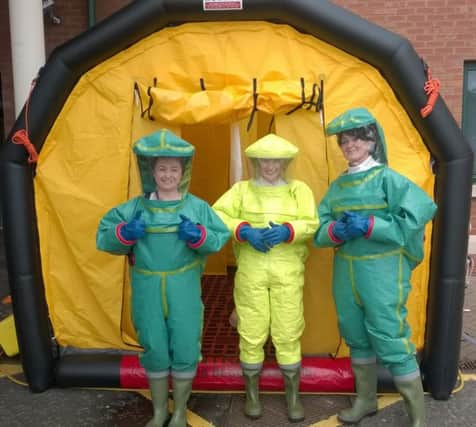Trust staff prepare for hazardous events


Emergency Department clinical staff from Antrim Area and Causeway hospitals recently completed an intensive one-day course covering the theory and practice of the required emergency response to incidents involving chemical, biological, radiological attacks or spillages.
Outlining the purpose of the training Kellie Liddy, Emergency Planning and Business Continuity Manager at the Northern Trust, said: “Our aim is to ensure that we as a Trust are prepared for every eventuality and staff are confident in providing the required response.
Advertisement
Hide AdAdvertisement
Hide Ad“An important part of the training is being able to provide the most effective care to patients as soon as possible, whilst protecting the staff involved and keeping the hospital environment safe.”
The practical session of the training involved instruction on the erecting and use of decontamination tents and putting on the decontamination suits.
Continuing Kellie Liddy said:“Feedback from staff has been good and staff now feel much better prepared to cope with any emergency.
“Indeed, decontamination tents, located in each of the Emergency Departments can be erected in five minutes and the decontamination suits can be put on and be fully operational within five minutes.”
Advertisement
Hide AdAdvertisement
Hide AdUnder its Chemical, Biological, Radiological and Nuclear Plan (CBRN) the Northern Health and Social Care Trust has a duty to care for people contaminated with chemical, biological or radiological materials.
Such contamination could result from a deliberate release (e.g. terrorism) or the accidental release of hazardous material from industrial and commercial premises, transport accidents or the illegal disposal of contaminated waste.
CBRN incidents have the potential to produce large numbers of contaminated casualties.
Many such casualties may self-refer to Emergency Departments (ED) since they may leave the scene of the incident before the emergency services can attend and provide decontamination, or the onset of symptoms are delayed.
Advertisement
Hide AdAdvertisement
Hide AdThe number of casualties that may self-present may be increased by those that have, or fear they have, been cross-contaminated.
This can bring severe disruption to hospitals and pose potential risks to hospital staff. www.ballymoneytimes.co.uk